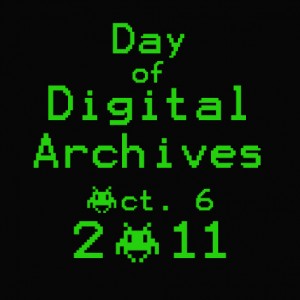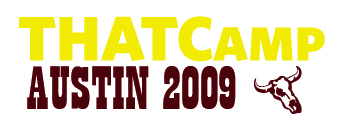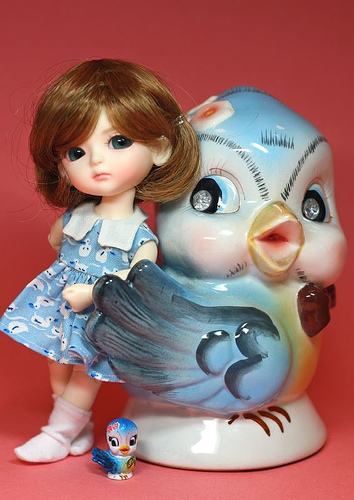
My path to the inaugural THATCamp started at the Society of American Archivist’s 2006 annual meeting in DC. I was a local grad student presenting my first poster: Communicating Context in Online Collections – and handing out home-printed cards for my blog. When I ran out, I just wrote the URL on scraps of paper. I found my way to session 510: Archives Seminar: Possibilities and Problems of Digital History and Digital Collections, featuring Dan Cohen and Roy Rosenzweig, described in the SAA program as follows:
The co-authors of Digital History: A Guide to Gathering, Preserving, and Presenting the Past on the Web lead a discussion of their book and, in particular, the possibilities of digital history and of collecting the past online. The discussion includes reflections on the September 11 Digital Archive and the new Hurricane Digital Memory Bank, which collects stories, images, and other digital material related to hurricanes Katrina, Rita, and Wilma.
The full hour and twenty-four minutes audio recording is available online if you want to dive down that particular rabbit hole.
2006 was early in the “archives blogging” landscape. It was the era of finding and following like-minded colleagues. RSS and feed readers! People had conversations in the comments. 2006 was the year I launched my blog. My post about Dan & Roy’s session was only the 9th post on my site. I was employed full time doing Oracle database work at Discovery and working towards my MLS in the University of Maryland’s CLIS (now iSchool) program part-time. So I added Dan’s blog to the list of the blogs I read. When Dan invited people to come to THATCamp in January of 2008 and I realized it was local – I signed up. You can see my nametag in the “stack of badges” photo above. For a taste of my experiences that day, take a look at my 2008 THATCamp blog posts.
In 2008, the opportunity to sit in a room of people who were interested in the overlap of technology and humanities was exciting. As a part-time graduate student (and wife and mother of a 6-year-old), I spent almost no time on campus. I did most of my thinking about archives and technology at home late at night in the glow of my computer screen. There was not a lot of emphasis on the digital in my MLS program at UMD. I had to find that outside the classroom.
The connections I made at that first THATCamp extend to today. As mentioned elsewhere, I was part of the group who put together the first regional THATCamp in Austin as a one-evening side-event for the Society of American Archivists Annual Meeting in 2009. I swear that Ben Brumfield and I were just going to meet for dinner while I was in Austin, where he lives, for SAA. Somehow that turned into “Why not throw a THATCamp?”. How great to have no idea of the scale of what we were taking on! Ben did an amazing job of documenting what we learned and tips for future organizers, including giving yourself more time to plan, reaching out to as diverse a group as possible, and planning an event that lasted longer than four hours. All that said, it was a glorious and crazy evening. I still have my t-shirt. While our discussions might have been more archives-skewed than at most THATCamps, it also gave lots of archivists a taste of what THATCamp and un-conferences were like. Looking through the posts on the THATCamp Austin website, there was clearly an appetite for the event. We could easily have had enough topics to discuss to fill a weekend – but only had time for two one hour session slots, plus a speed round of “dork shorts” lightning talks.
I know I went to other THATCamps along the way. I graduated with my MLS in 2009. I started an actual day-job as an archivist in July of 2011 at the World Bank. Suddenly I got paid to think about archives all day – and I didn’t need my blog in the way I used to. I started writing more fiction and attending conferences dedicated to digital preservation. Somewhere in there, I went to the 2012 THATCamp Games at UMD.
THATCamps brought together enthusiastic people from so many different types of digital and humanities practice — all with their own perspectives and their own problems to solve. We don’t get many opportunities to cross-pollinate among those from academia and the public and private sectors. Those early conversations were my first steps towards ideas about how archivists might collaborate with professionals from other communities on digital challenges and innovations. In fact, I can see threads stretching from the very first THATCamp all the way to my Partners for Preservation book project.
Thanks, THATCamp community.
This post is cross-posted as part of the 2020 THATCamp retrospective.



